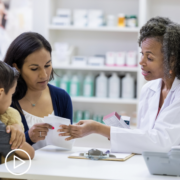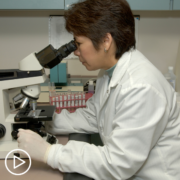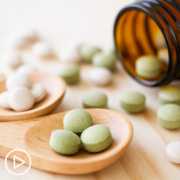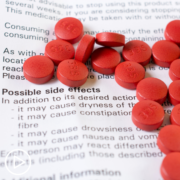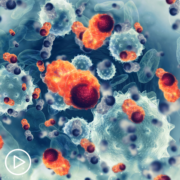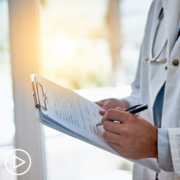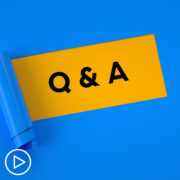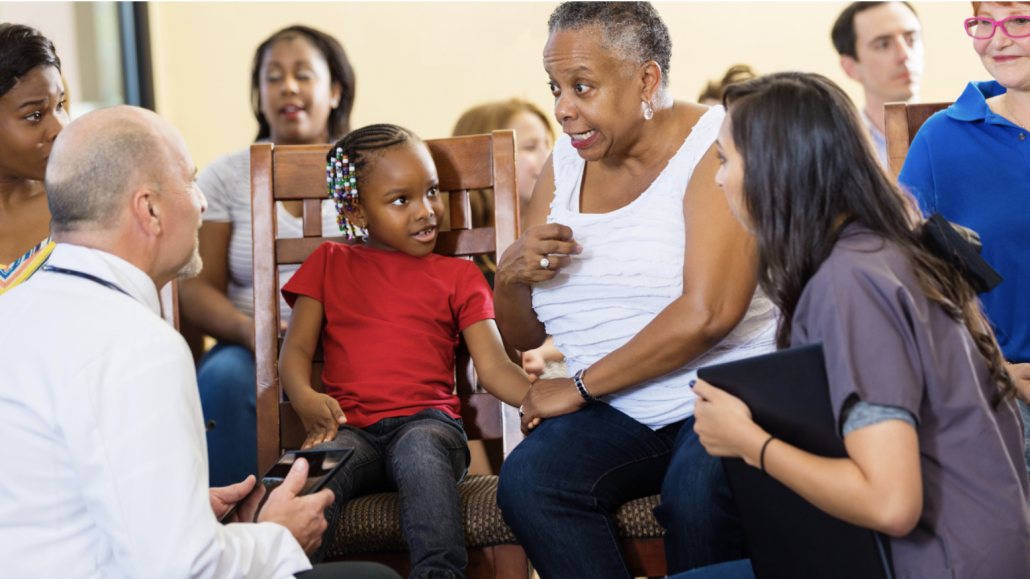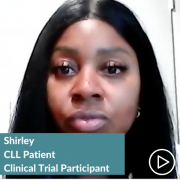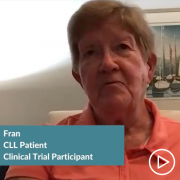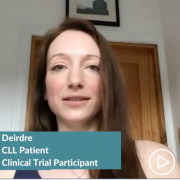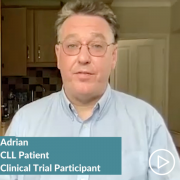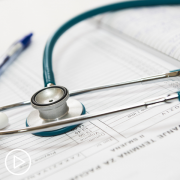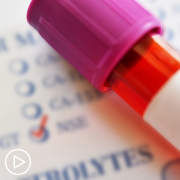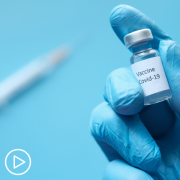Dr. Nadia Khan | CLL Patient-Expert Q&A from Patient Empowerment Network on Vimeo.
Is CAR T-cell therapy a cure for chronic lymphocytic leukemia (CLL)? What specific lab tests will I need to get a second opinion? CLL expert Dr. Nadia Khan answers questions from CLL patients and families.
Have a question for a future Patient-Expert Q&A Email us: question@powerfulpatients.org with subject line: CLL Patient-Expert Q&A
See More from START HERE CLL
Related Programs:
Transcript:
Mary Leer:
Dr. Khan, first of all, thank you for being part of this program.
Dr. Nadia Khan:
Thank you so much for inviting me to participate.
Mary Leer:
We have a question from Larry about side effects. Larry says: I’ve been fighting side effects with each medicine. Will the correct answer for side effects in CLL always be to stop the medicine?
Dr. Nadia Khan:
Larry, thank you for your question. It is an excellent one, and this is something that we encounter on a very regular basis in CLL patients who are on targeted therapies. The side effects occur frequently in patients taking BTK inhibitors, in patients taking PIK inhibitors, and we have some side effects reported on BCLT inhibitors as well, typically side effects on all of these targeted therapies can be managed with either dose reduction or supportive therapies, and we don’t necessarily have to stop a medication due to a side effect that is encountered, and of course, it would depend on the type of side effect and the severity of the side effect before deciding to pause therapy for a time or to dose reduce or add other medications to help.
Mary Leer:
Sarah has a question about side effects. How can I tell if side effects are from CLL, my medicine, or just a part of aging?
Dr. Nadia Khan:
Thanks for that question, Sarah. It can be a challenge to tease out the cause of any given complaint, whether the symptom is due to underlying other medical conditions, the medications a patient is on, their CLL therapy, their CLLl itself is something that we find to be challenging, and it can often be a process of elimination and understanding when side effects started and how they are related to the known side effect profile of a therapy is often a starting point. Depending on the side effect, we may decide to institute a treatment holiday, and if the side effect improves or resolves during the treatment holiday, it’s more clear that the side effect is due to the medication in question. If the side effect persists during that period of time, then it’s more likely to be due to something else.
Mary Leer:
George asks, are there any long-term side effect risks for CLL patients?
Dr. Nadia Khan:
That’s a great question, George. It really would depend on the therapy being instituted and when in the chemoimmunotherapy era for CLL patients, we have a very different perspective of what short-term and long-term side effects were and are for those patients who have been treated with chemoimmunotherapy. For patients treated with targeted therapies and immunotherapy combinations today, there tends to be fewer serious long-term side effects when looking at the various drug classes. For example, BTK inhibitors, there is a risk of atrial fibrillation that remains constant throughout the course of therapy, and if a patient is on therapy for one year or 10 years, they can develop that particular side effect. High blood pressure can be significant with BTK inhibitors as well, and that risk also tends to be stable. In terms of infection risk, there is relative immunosuppression with all CLL therapeutics, and so our concern, more recently has been focused on COVID infection, serious bacterial and viral infections tend to be less frequent, we don’t institute prophylaxis for those infections because they tend to be so few and far between in the patients that we’ve treated.
Mary Leer:
Thank you, Dr. Khan. Here’s a question from Richard: I am a CLL patient currently on “watch and wait.” When is the right time and what tests should have been performed before seeing a CLL specialist?
Dr. Nadia Khan:
Richard, thank you for your excellent question. There are a number of tests with respect to CLL that help us to prognosticate more accurately, and those would include either a FISH panel, fluorescence in situ hybridization for CLL which identifies this common amplification and deletions that have been described in CLL. Additionally, an IgVH mutational test and a TP53 sequencing test would be the three basic prognostic tests used to identify what kind of CLL a patient has. This testing should be repeated at any point wherein a patient is changing therapy or at any point where there’s a change in the clinical status of the patient. Outside of these standard tests, there are other molecular tests that can be ordered and are commercially available for use… For use by clinicians. These molecular tests can also identify changes within the CLL that can help to prognosticate at this time, outside of the standard tests that I mentioned to you, there are no proven benefits to other testing, but the results of additional testing can just really help inform your clinician about the likelihood of you needing treatment in the near future and the likelihood of response to therapy.
Mary Leer:
This question comes from Laurie. How common is it for CLL patients to develop a second gene mutation?
Dr. Nadia Khan:
Laurie, Thanks for that question. It is not common for most call patients to have significant alterations in the genetic landscape of the CLL. With that being said, there are a few notable exceptions for CLL with TP53 dysfunction or complex cytogenetics, there is a higher likelihood that there will be genetic instability in those CLL clones. Therefore, it’s important to retest for changes if there is a change in the biology of the CLL, if there is a progression on therapy, for example, or at the time when a new therapy is planned.
Mary Leer:
Yolanda’s question is, what is CAR T therapy and who is eligible?
Dr. Nadia Khan:
Thank you, Yolanda. This is a question that I get asked very frequently. CAR-T therapy is an exciting cellular therapy that has been FDA-approved in a number of lymphomas, and it is currently not FDA-approved for patients with CLL. So at this time, CLL patients can receive CAR-T therapy in the setting of a clinical trial only, and it is typically reserved for those patients who have progressed or relapsed after multiple lines of therapy and for whom there is no alternative therapy for consideration. Often, it is considered in the context of the clinical trial prior to the use of allogeneic stem cell transplant, because the results of allo transplant and CAR-T seemed to be fairly comparable. CAR T therapy, however is much better tolerated than allo transplant, both of these modalities are very rarely employed for our CLL patient today because of the very effective targeted therapies and immunotherapies that we have to use.
Mary Leer:
Dr. Khan, Chuck’s question is, what are the side effects of CAR-T cell therapy?
Dr. Nadia Khan:
Thank you, Chuck. For your excellent question, CAR-T-therapy is associated with two main types of side effects, one is Cytokine Release syndrome or CRS, which happens within the first two weeks of receiving CAR cells, and that can manifest as fevers, chills, a drop in blood pressure, shortness of breath, and the requirement of oxygen. When that happens to patients, there are medications that are given to help improve those cytokine-mediated events. Another major side effect with CAR-T therapy is neurotoxicity, which also happens within the first 14 days in some patients who receive CAR therapy, and that can manifest as anything from a headache to more concerning confusion, seizures and coma. CRS happens commonly in patients who receive party therapy and is usually managed very successfully with anti-inflammatory therapies given intravenously in the hospital and can be used for patients even who get outpatient CAR-T therapy.
Dr. Nadia Khan:
When patients do suffer with neuro toxicities, intravenous therapies are also employed to combat that, and when necessary, patients might require escalation to an intensive care setting when these toxicities are very severe.
Mary Leer:
Dr. Khan, is CAR T therapy a cure for CLL?
Dr. Nadia Khan:
Thank you for your question, Bernard. CAR-T therapy has been curative for a minority of patients who have been treated with CARs on clinical trials, and unlike other lymphomas In CLL, there hasn’t been an FDA approval as yet for CAR-T therapy, and we are hopeful for that to change in the future as CARs are modified and may potentially become more effective at eradicating the CLL and hopefully resulting in better side effect profiles and patients who do receive CAR-T therapy, the majority of patients who have received CARs in CLL studies have not had durable remission, unfortunately.
Mary Leer:
Dr. Khan, what is conditioning therapy and why is it given prior to infusion of the CAR T cells?
Dr. Nadia Khan:
Thank you, Samuel. Conditioning therapy is a course of – a briefer course of chemotherapy that’s given just prior to CAR-T therapy, really to prepare the body in a way to receive the CARs, and it makes the CARs more effective when there has been a level of immunosuppression to allow the CARs to expand more freely after they have been re-infused into a patient.
Mary Leer:
Okay, here’s a question that Sandra asks, I’m preparing for CLL treatment, can I take my vitamins, herbs, or other supplements during treatment?
Dr. Nadia Khan:
Thanks for that excellent question, Sandra. It’s so important to review all of your medications with your provider before starting any therapy during the course of your CLL treatment, drug interactions with herbals and over-the-counter medications can result in serious side effects, some over-the-counters and Herbals can inhibit the effectiveness of CLL therapy. So it’s important to discuss these with your provider on a case-by-case basis.
Mary Leer:
Dr. Khan, here’s a question that I think many are probably thinking of right now, what tests do you give patients to see if CLL treatment is working?
Dr. Nadia Khan:
Thank you, Jessica. During the course of CLL treatment and at the end of a time-limited treatment course, we’re assessing for responses, so as a patient is going through their treatment, we may decide to re-image to determine if there has been debulking of lymph nodes. And depending on the treatment that we’re administering and where the lymph nodes are located, we may decide to do imaging sooner or later, so for example, if there are palpable lymph nodes while a patient is on therapy, and we can measure these readily by physical exam in the clinic, we may not feel as compelled to re-image at an early time point, if there is valiantly or in large seen that is hard to palpate. And we want to understand if treatment is working after approximately three to four cycles of therapy, we would assess for a good response to treatment if clinically, it also does appear that patients are responding, and if there was any question as to respond, we would image at an earlier time point when patients are being treated with a Venetoclax [VENCLEXTA] based regimen and there is significant adenopathy or an enlarged spleen, we may reassess the size of lymph nodes and spleen during the course of Venetoclax [VENCLEXTA] ramp-up to determine if patients can be transitioned from inpatient to outpatient ramp-up.
Mary Leer:
Dr. Khan, this is our final question. Karen asks, with many new therapies available, will watch and wait be redefined for CLL patients?
Dr. Nadia Khan:
What an excellent question, Karen. Currently, the strategy for CLL patients is to institute therapy when there is likely to be a benefit with the intervention, and there are studies that are ongoing looking at earlier intervention with oral therapy, and once we see the readout for patients with particularly high-risk features. I think it is possible that we’ll have an alternative strategy for those patients. Thankfully, our CLL patients live very long lives, and what we’ve come to see over decades of treatment experience with our CLL patients is that early intervention to date has not resulted in longer… Longer survival. So at this point, it’s not something that’s recommended, but we may have more information soon.
Mary Leer:
Dr. Khan, thanks for joining us today and answering all of these questions for our audience. Just a reminder to our audience, please take the CLL-Patient-Expert Q&A survey following this webinar.
Mary Leer:
Dr. Khan, before we end this program, what are you optimistic about for the future of CLL?
Dr. Nadia Khan:
So I’m very optimistic about the future of CLL therapeutics, we’ve already come to see excellent responses that are very durable with time-limited targeted therapy and immunotherapy approaches. In the future, it is likely that we will be using a more personalized approach to treating any given CLL patient using their genetic and molecular profile to decide on their treatment strategy, a single-agent approach versus multiple targeted therapies to eradicate CLL clones. In the future will be looking at endpoints like minimal residual disease, as well as clonal evolution to help guide our treatment strategy for patients with CLL
